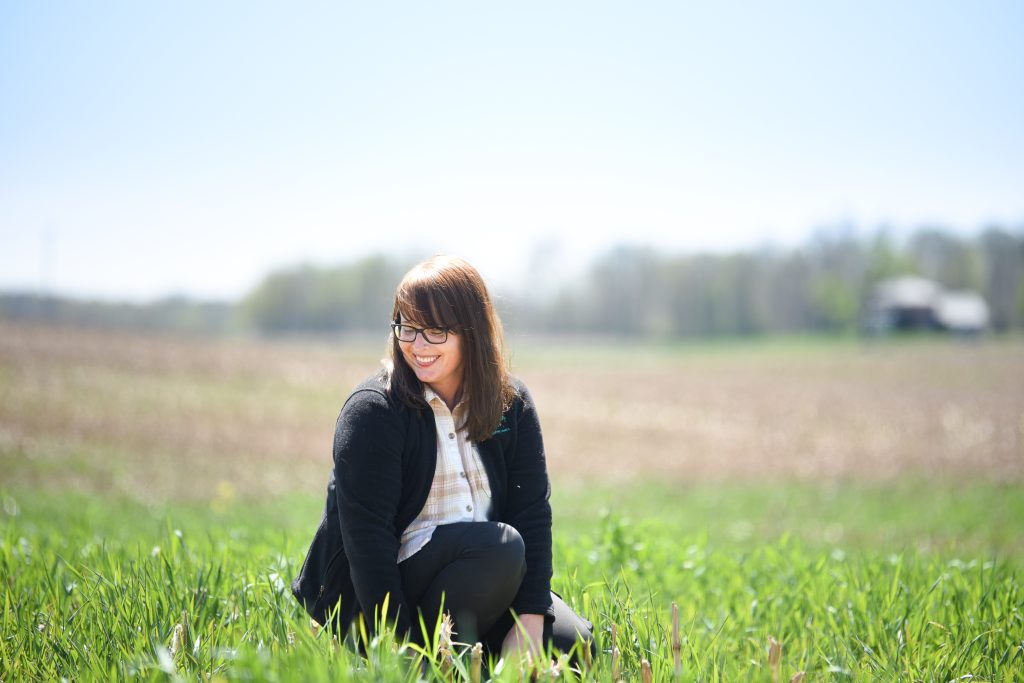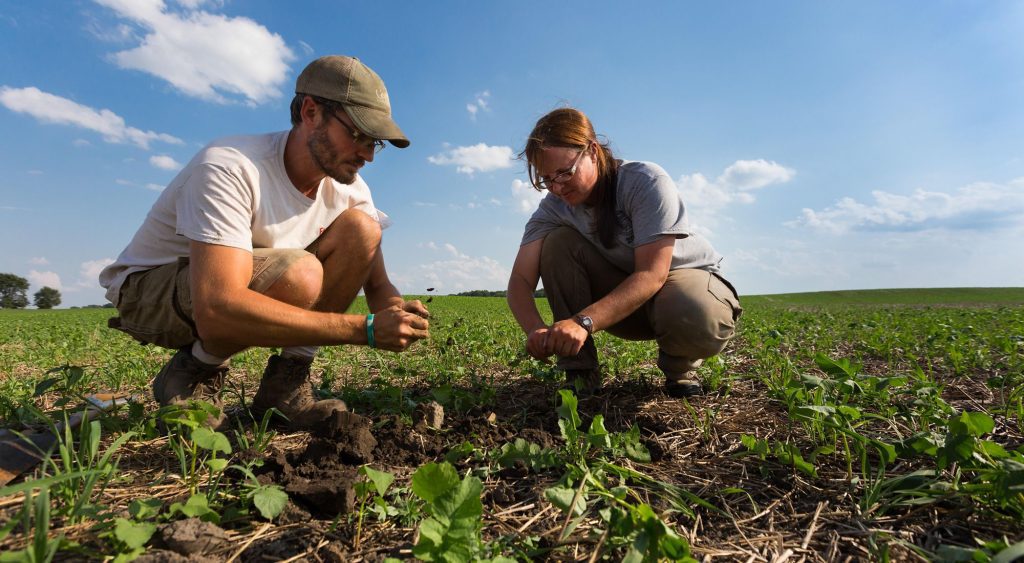Delbecq takes reigns of family’s farm as sixth generation
By Dave Blower Jr.
Not everyone who grows up on a farm sees their future in growing and producing crops. For many farm kids, what gets passed to them first are principles like hard work, persistence, creative thinking and a constant desire to learn.
Brechbill Farms has been in the same family for 160 years near the town of Auburn in the northeastern corner of Indiana. Growing up, Sarah Delbecq was encouraged in those long-lasting principles of farm life without any pressure to become the sixth generation to operate the farm. Both pursued higher education and dreams in more urban settings.

When asked if she ever imagined herself owning and operating Brechbill Farms, Delbecq said, “No, absolutely not – 100 million percent no.”
However, she doesn’t regret the decision she made with her husband, Benoit, to come back to the farm more than 10 years ago.
“So, I’m part of the sixth generation of Brechbill Farms. We date ourselves back to this little corner of the world to 1864,” Delbecq said. “All of the generations before, that’s what we’ve done. I guess by the time I came around, I had no interest in pursuing anything with respect to agriculture. I was aware of where I grew up, and I appreciated the lifestyle. There was never any envy to go live in town or anything like that. I just did not see myself running the farm.”
Highly educated, Delbecq has a degree in government and economics from Georgetown University in Washington, D.C., another degree in agricultural economics from Purdue University and a master’s degree in public policy from the University of Chicago. While at Georgetown, she admitted that most of the other students came from more urban areas from the East Coast. She began to see how valuable her knowledge of agriculture could be in the public policy arena.
“I was at a school where people really didn’t know what a tractor was,” Delbecq said. “They didn’t know what corn looked like. They would ask, ‘What are soybeans?’ No one was negative. It was a reality that most of these people were unfamiliar with where I came from or what life was like for Indiana farmers.”
This realization flipped a switch in her mind, she explained.
“I never went to Georgetown with the idea of getting away from the farm,” Delbecq said. “I went there with the idea of pursuing something I had an interest in. I was more interested in public policy – not politics. I was interested in policy that solved problems. I learned that I was unique among the people I was meeting. I began to think about agricultural policy.”
Operating the farm
Life can often bring people back to their roots. Delbecq’s mother, Maxine, passed away in 2008. Later, her father, Phil, was looking to shed some of the day-to-day responsibilities on the farm. At the time, Delbecq and her husband were pursuing their ag-related careers, but not necessarily a farm life.

“We probably were not unlike plenty of farm families,” Delbecq said. “I don’t know that (my parents) really had any plans for the farm after them, necessarily. I mean there could have been a lot of emotion for the investment and the history of the farm. But I also know I’ve heard my dad say, ‘Someone could turn it all into a golf course tomorrow, and we would move on.’ I think my family has major respect for tradition and all of those things, but at some point, there’s just a practicality.”
Delbecq met Benoit, who grew up in large cities in France, while they were students at Purdue. After they were married, they were working in ag policy and economics in Washington, D.C. Neither had thought much about operating the family farm. In early 2014, they made the decision to return to the farm and help her father.
“I think for us, it was just, ‘maybe we should try to go do that,” Delbecq said. “This could be an opportunity to do something; something that we could apply some of our skill set to. I don’t know that anyone was expecting us to move here. Clearly it was never part of laid-out-plan, but not all farms have super, laid-out plans.”
Phil quickly decided what he didn’t want to do any more, while still doing other farm duties. Delbecq and her husband became quick learners on the farm.
“There were things that (Phil) was very quick to hand over to us,” she said. “Benoit planted all of the corn that first year. I look back on some of those days and I tell (Benoit), ‘you really had no idea what you were doing, literally.’ But that’s all been part of the process.”
In 2016, her father had a health scare, and that ultimately cemented a decision to stay on the farm.
“Practically speaking, because (Phil) had a health situation to deal with, we know that his day-to-day responsibilities did not have to be dictated by the farm. So, now, we’re getting ready to harvest our third crop, and that was pretty much a line in the sand. We had to make a decision.”
Seeking policy and checkoff work
Before that first crop was harvested in 2014, Delbecq received a call from Jane Ade Stevens, who at the time was the CEO for the Indiana Soybean Alliance (ISA), the Indiana Corn Marketing Council (ICMC) and the Indiana Corn Growers Association (ICGA). Stevens explained that there were openings on the ICGA and ICMC boards of directors. Stevens encouraged Delbecq to apply for these positions because of her youth, perspective and education.
Delbecq’s father had served on the soybean board in the 1990s, and her older sister, Beth Bechdol, was building a career a career by working for the Senate Ag Committee, Sen. Richard Lugar’s office and then the Indiana State Department of Agriculture.
“I know (Jane) knew who I was,” Delbecq said. “She would have known my sister, clearly, and my dad had been on the soybean board. I have memories of him going to soybean board meetings. That’s something I associate with him as a farmer. So, it wasn’t a complete cold call, anyway.”
During the call, Delbecq didn’t believe she had the experience to serve on the ICGA or ICMC boards.
“We haven’t even harvested a crop, yet,” she said. “Why would you put someone on the Indiana Corn Growers Association board when their corn hadn’t even gotten to the black layer, yet?”
The longer the conversation, the more Delbecq realized she could offer something to the board.
“The conversation covered several subjects related to policy that I clearly had an interest in,” she said. “You have to think about the things you know, and you have to know about the things that make your wheels spin. The things that make you tick. These issues were right up my alley of interest. There are farmers out there who don’t want to think about what’s going on in Washington. It’s not part of their day-to-day, and they don’t want it consuming any headspace.
“After a while, it became obvious that there was something I could offer here. This wasn’t as crazy of an idea as I initially thought.”
Later this year, Delbecq will complete her nine years in office on the policy-focused ICGA board and her checkoff-funded ICMC board leadership.
Many types of leadership
Delbecq encourages farmers to invite state and federal lawmakers and others to their farms and put them on equipment and explain their work to those who don’t understand it. She said when senators and representatives see the size and scope of most farms, they understand why agriculture pushes for more global trade access and fewer restrictions.
The checkoff, Delbecq added, prepares the farmers to be ready to act when the policy hurdles have been cleared.
“Just being present in those global markets for corn helps us compete, and that’s on the checkoff side of things,” Delbecq said. “These things run parallel. When tariffs and trade issues are sorted out, export opportunities can unfold. When government figures out the future of ethanol and biofuels, the checkoff helps create the opportunities to supply that industry. Ultimately, we’re working collectively to help the bottom line of all Indiana farmers.”
She is accustomed to making those executive decisions on the farm, too. As a woman, she said, Delbecq will occasionally encounter someone who doesn’t recognize her as the farm’s decision-maker. “Every so often, I’ll have someone ask me, ‘Can I talk to the boss?’” Delbecq said. “I will explain to them pretty quick that I am the boss, and then the problem is over with. I hope that this helps others who might want to pursue this career, this life, too.”
Through it all, active learning is what she pursues most.
“Every year’s different, you know,” Delbecq explained. “You’re never going to say, ‘I’ve got it all figured out.’ I think, for both of us, there’s a very intense interest in learning new things. Unlike some farms, we are no way tied to farming the way it has always been done. We’re not trying to come in and do everything completely different, either. But that’s what keeps farming exciting in some respects. You think about what you might have done 10 years ago, and there could be some entirely new things still on the horizon to adapt to. I think that’s good. I think (Benoit and I) fall into the same category of truly enjoying that every day is a little different.”
Posted: May 18, 2024
Category: ICGA, Indiana Corn and Soybean Post - May 2024, News




